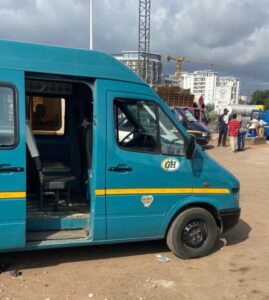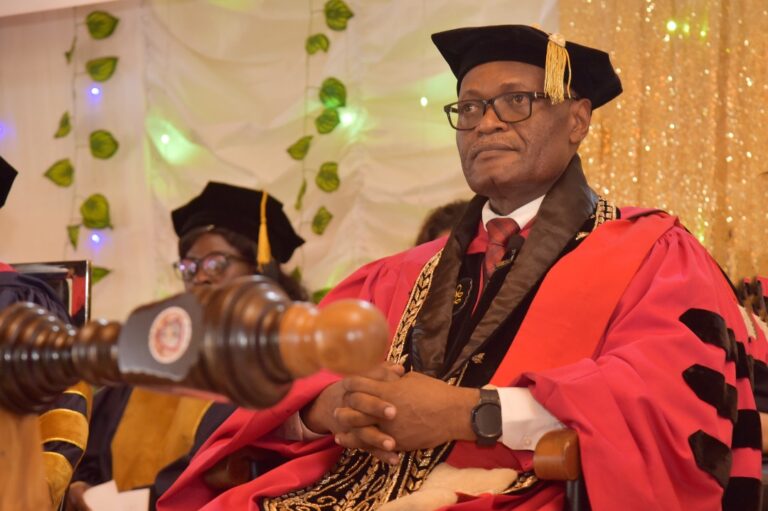When Moses Fokuo, a Person With Disability (PWD) who uses a wheelchair, steps out of his home in Kwabenya, Accra, to catch a bus, his journey is often met with frustration.
Despite the promises of inclusive public services, the harsh reality is that many transport operators refuse to pick him up.
“When I am going somewhere and stand at a bus stop, drivers usually want to pick my guide and leave me behind,” he says, his voice heavy with disappointment. “Some drivers won’t even stop when they see me,” he said.
For Mr. Fokuo and thousands of PDWs across Ghana, moving from one place to another is an ongoing struggle.
The transport sector, a vital lifeline for many, remains inaccessible mainly despite legal frameworks like the Ghana Disability Act 2006, which mandates equal access to public spaces and services.

Accessible transportation is not a luxury, it is a necessity for people with disabilities to access education, employment, and healthcare.
Yet, in Ghana, public transportation is riddled with barriers that make exercising this basic right difficult.
According to a report by the Ghana Statistical Service, approximately 8% of Ghanaians live with some form of disability.
For these individuals, inaccessible buses, lack of proper pedestrian crossings, and dismissive attitudes from drivers and passengers are not just inconveniences, they are systemic failures.
Again, a study by Prince Kwame Odame et al. published in Social Science and Humanities Open, a multidisciplinary, open-access journal that covers all areas of the social sciences, economics, and humanities, the accessibility of public transportation in Ghana for persons with disabilities remains a major concern.
Researchers conducted semi-structured interviews with public transport drivers and observed transportation terminals to gather data. The study found that the floor height of public transport buses was a significant barrier for PWDs, particularly those with mobility impairments.
Despite acknowledging the challenges posed by high-floor buses, drivers were reluctant to install ramps or modify their vehicles to accommodate PWDs.
The main reasons cited were the financial burden of installing ramps, stiff competition from other transport providers, and the availability of conductors to assist PWDs.
However, this assistance was often crude and potentially embarrassing for PWDs. The study highlights the need for policy interventions to ensure that public transportation in Ghana is accessible and inclusive for PWDs.
The findings suggest that transport operators require incentives and support to modify their vehicles and provide accessible services. Additionally, there is a need for greater awareness and education among transport operators and the general public to promote the rights and dignity of PWDs.

A 207 Benz bus used for public transport (Trotro) in Accra. Source: Happy Ghana
Efforts to engage the President of the Ghana Disability Federation, Mr. Joseph Atsu Homadzi, for an interview on the federation’s efforts to advocate for improved disability accessibility in the transport sector were unsuccessful.
Despite requests, the President was unavailable to comment on the Federation’s initiatives and interactions with government agencies on this critical issue.
Mr. Fokuo recounts the daily indignities he faces: “When I request a ride through Bolt, some drivers cancel the trip when they realize I use a wheelchair. Even when they agree to pick me up, only a few engage with me throughout the journey. Others simply pretend I am not there.”
The experience is no different when using long-distance transport services. VIP buses and Intercity STC Coaches, for instance, lack ramps or automated lifts, making it nearly impossible for wheelchair users to board independently. “Unless someone volunteers to carry me on their back, I cannot get on board,” Mr. Fokuo laments.
Despite repeated attempts, efforts to get officials of the State Transport Corporation (STC) to comment on the corporation’s disability accessibility policies proved futile. A formal request for an interview sent to the corporation’s management went unanswered.
The challenges faced by PWDs in Ghana’s transport sector are multifaceted. Beyond physical inaccessibility, attitudes toward disability compound the problem. “Some passengers visibly recoil when they realize I am a PWD. Others avoid physical contact altogether,” Mr. Fokuo explains.
These prejudices are amplified by infrastructure gaps. Busy roads lack essential pedestrian features like zebra crossings, or where they exist, they are often faded and ignored by motorists. “I once tried to cross a road, and though one driver stopped, another sped toward me without any intention of slowing down. If I had not hurried, I could have been hit,” he recounts. Policy and funding barriers also exacerbate the situation.
Although the Ghana Disability Act mandates accessible public transportation, enforcement remains weak. Advocacy groups have engaged with transport operators on multiple occasions, but meaningful change is yet to be seen.
Despite the serious realities, there are ongoing efforts to improve accessibility in Ghana’s transport sector.
Government initiatives like the Ghana Disability Act of 2006 lay the foundation for equal access, but implementation is slow. “The vehicles they import should be ones that PWDs can board without assistance,” Mr. Fokuo insists.
Private entities like the Ghana Private Road Transport Union (GPRTU) have been involved in discussions and initiatives aimed at improving transportation accessibility for persons with disabilities.
For instance, scholars from the University of Education, Winneba (UEW), and the University of Nairobi (UoN) have collaborated on projects like “Removing Barriers to Disability-Inclusive Transport Systems,” engaging with GPRTU representatives to address these issues.
Additionally, the Ministry of Gender, Women and Social Protection has urged transport operators, including GPRTU, to consider accessibility in their services by reserving seats for pregnant women, mothers with infants, and PWDs.
The Vice Chairman of GPRTU in the Ashanti Region, Addai Samuel, also speaking at an event in Kumasi, expressed the union’s readiness to implement lessons from such programs.
While these engagements indicate GPRTU’s involvement in discussions about inclusive transportation, specific outcomes or comprehensive plans resulting from these initiatives are not detailed in the available sources.
Ride-hailing services offer a semblance of convenience but often at exorbitant costs. “A round trip from Kwabenya to Accra Digital Centre costs me almost GH₵250. It is unaffordable,” Fokuo says.
The path to inclusive transportation requires a multi-pronged approach. From retrofitting vehicles to providing comprehensive training for transport staff, there is much work to be done. “We need zebra crossings with personnel to assist PWDs, children, and the elderly,” Fokuo urges.



